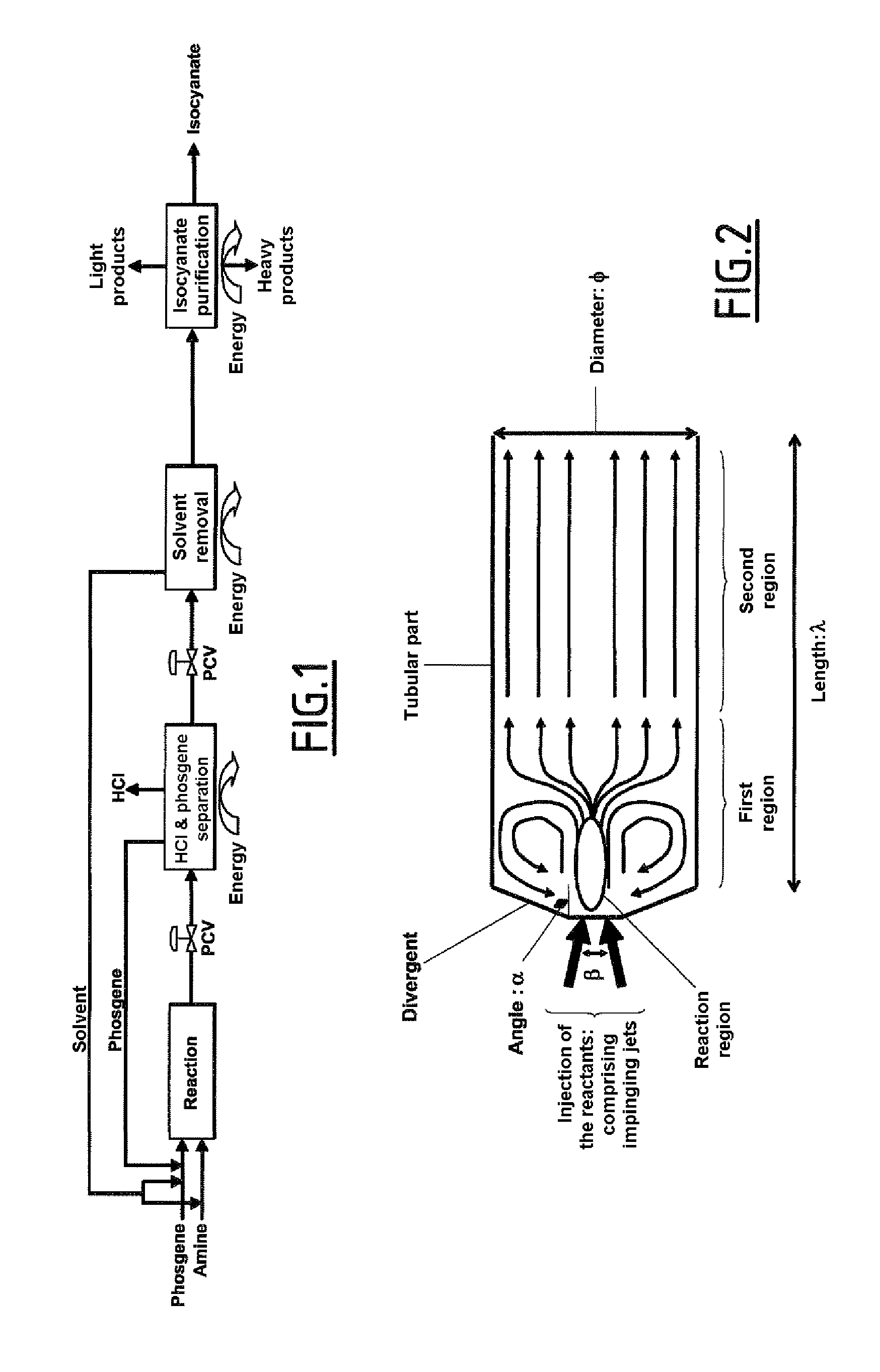Use of a piston reactor to implement a phosgenation process
a technology of phosgenation reaction and piston reactor, which is applied in the preparation of isocyanic acid derivatives, chemical/physical/physico-chemical processes, and organic chemistry. it can solve the problems of falling yield of phosgenation reaction and difficulty in ensuring the safety of personnel, and achieve good yield, simplify the effect of the plant and promote safety
- Summary
- Abstract
- Description
- Claims
- Application Information
AI Technical Summary
Benefits of technology
Problems solved by technology
Method used
Image
Examples
example 1
[0076]150 kg / h of a solution of hexamethylenediamine diluted to 15% by weight in monochlorobenzene and 250 kg / h of a solution of phosgene diluted to 75% by weight in monochlorobenzene are cointroduced, by means of an injection system comprising impinging jets, into a heat-insulated reactor of plug-flow type with internal recycle (cf. FIG. 2) defined by a length λ=2 m, a diameter φ=7.5 cm and a divergent angle α=25°. The solutions of reactants are conveyed by means of high pressure pumps; the temperature of the hexamethylenediamine solution is 145° C. and that of the phosgene solution is 180° C. The injection system makes it possible to bring the jets of reactants into contact with an angle β of 25° with jet speeds respectively of 40 m / s for the amine solution and 60 m / s for the phosgene solution. The pressure in the reactor is regulated at 40 bar by means of a pressure control valve (PCV) and the resulting mean temperature is 185° C. After reducing this reaction medium in pressure, ...
example 2
[0077]300 kg / h of a solution of toluenediamine diluted to 18% by weight in ortho-dichlorobenzene and 500 kg / h of a solution of phosgene diluted to 75% by weight in ortho-dichlorobenzene are cointroduced, by means of an injection system comprising impinging jets, into a heat-insulated reactor of plug-flow type with internal recycle (cf. FIG. 2) defined by a length λ=3 m, a diameter φ=5 cm and a divergent angle α=20°. The solutions of reactants are conveyed by means of high-pressure pumps; the temperature of the toluenediamine solution is 125° C. and that of the phosgene solution is 100° C. The injection system makes it possible to bring the jets of reactants into contact with an angle β of 35° with jet speeds respectively of 30 m / s for the amine solution and 40 m / s for the phosgene solution. The pressure in the reactor is regulated at 35 bar by means of a pressure control valve (PCV) and the resulting mean temperature is 145° C. After reducing this reaction medium in pressure, removi...
PUM
| Property | Measurement | Unit |
|---|---|---|
| speed | aaaaa | aaaaa |
| speed | aaaaa | aaaaa |
| angle | aaaaa | aaaaa |
Abstract
Description
Claims
Application Information
 Login to View More
Login to View More - R&D
- Intellectual Property
- Life Sciences
- Materials
- Tech Scout
- Unparalleled Data Quality
- Higher Quality Content
- 60% Fewer Hallucinations
Browse by: Latest US Patents, China's latest patents, Technical Efficacy Thesaurus, Application Domain, Technology Topic, Popular Technical Reports.
© 2025 PatSnap. All rights reserved.Legal|Privacy policy|Modern Slavery Act Transparency Statement|Sitemap|About US| Contact US: help@patsnap.com


